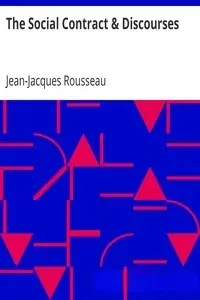Summary
The Social Contract & Discourses by Jean-Jacques Rousseau is a foundational work in political philosophy and Enlightenment-era thought that explores the legitimacy of political authority, freedom, and the structure of a just society.
In The Social Contract, Rousseau famously declares, “Man is born free, and everywhere he is in chains,” and goes on to propose that legitimate government arises from a social contract—a mutual agreement among free individuals to form a collective political body guided by the general will. He advocates for popular sovereignty, civic freedom, and direct participation in lawmaking as cornerstones of a truly democratic society.
The accompanying Discourses delve into related themes:
The Discourse on the Origin of Inequality traces how social hierarchies and property ownership corrupted natural human equality.
The Discourse on the Arts and Sciences critiques the Enlightenment’s celebration of reason and culture, arguing they have led to moral decay rather than progress.
Together, these writings challenge traditional power structures and lay the groundwork for modern democratic and revolutionary thought.
Rousseau's ideas heavily influenced the French Revolution and continue to provoke discussion on freedom, equality, and the role of the state.
